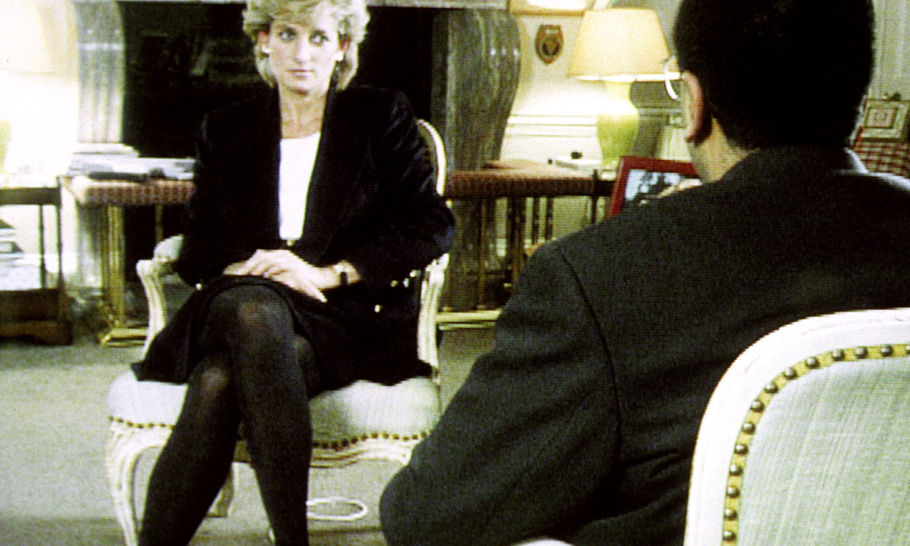Over Bashir, the BBC has shown pusillanimity in the service of mendacity

20 November 1995 of Diana, Princess of Wales, Interviewed by Martin Bashir
Not for the first time, the BBC is in turmoil. The reason is a familiar one: a dark secret, hidden in plain sight for quarter of a century by the Corporation, has come to light. Behind the scenes at Broadcasting House, executives and editors, board members and lawyers have been desperately burning the midnight oil, as the drama inexorably approaches its denouement. Last Sunday, the Director-General, Tim Davie, tried to put off the day of reckoning by pulling the programme that would have exposed the cover-up. But he has merely succeeded in turning the drama into a crisis — a crisis that has already compromised the BBC’s good name and may yet engulf him, too.
The irony is that all this is the result, in part, of what promises to be a superlative documentary made by one of Britain’s greatest investigative reporters, John Ware, for the BBC’s own flagship programme, Panorama. (Full disclosure: Ware is also a contributor to TheArticle and his most recent piece, about Boris Johnson’s “reckless” policy in Northern Ireland, appeared here last week.) It is a disgrace that we have not yet been allowed to see his handiwork. Instead, licencepayers are left to glean from the press what has been going on in the upper echelons of our national broadcaster.
One of the biggest scoops in BBC history was the interview given in 1995 by Diana, Princess of Wales, to Martin Bashir — also for Panorama. In that interview, the most celebrated woman on earth unburdened herself about her unhappy marriage and mental health. Her divorce and death shocked and divided the nation. The British monarchy was shaken to its foundations. The Royal Family is still dealing with the consequences to this day.
Now the Diana story has morphed into the Bashir story. What we did not know at the time was that the Princess had apparently been induced to give the interview by forged evidence. Allegedly, she was shown bank statements purporting to show that she was being spied on by her own staff, paid by the security services — statements we now know to be fake. The BBC no longer denies that there were forgeries, but it claims that they played no part in obtaining the interview. Is this true? Who was responsible for the deception? Who authorised the cover-up? Why was the BBC silent for so many years?
These unanswered questions have already prompted an internal BBC inquiry led by the former Master of the Rolls, Lord Dyson. He is believed to have delivered his report last week. Like the Panorama investigation, the Dyson Report was expected to be published this week, though the BBC now says only that its findings will appear “very soon”.
The reason given for the delay of the documentary, and presumably also the report, is the BBC’s “duty of care” for Martin Bashir himself. The former religion editor, who has now left the Corporation, has suffered from a bad bout of Covid and underwent heart surgery in recent months. He has refused to be interviewed by John Ware and reportedly claims that his health would be adversely affected by the screening of the Panorama investigation. There is nothing surprising about such claims. What is extraordinary is that Tim Davie, doubtless under legal pressure, seems to have accepted them.
The fate of Bashir is, however, only one aspect of the story. His editor at Panorama in 1995, Steve Hewlett, is alleged to have found out about the forgeries soon after the interview was broadcast. He eventually informed the then Head of News and Current Affairs, Tony Hall. Senior management decided the story was too damaging to be revealed. Whistleblowers were allegedly sacked or blacklisted, including the graphic designer hired to make the forgeries. The whole murky business was buried for 25 years, during which time Tony Hall’s reputation as a “safe pair of hands” enabled him to return after a spell running the Royal Opera House to become Director-General in 2013 — ironically to clear up the crisis that blew up after Jimmy Savile’s death. He retired only last year as Lord Hall of Birkenhead; now he is barricaded behind lawyers. His role in the Bashir affair will be a major focus of both the Dyson Report and the Panorama documentary.
Yet the conduct of Hall’s successor, Tim Davie, is now also in question. How can any self-respecting Director-General — who is also the BBC’s editor-in-chief — allow advice from corporate management to overrule his editorial duty? By pulling the most important documentary the BBC has ever made about itself, Davie is humiliating every one of his 35,000 staff and trampling on journalistic ethics. Whatever happens now over Bashir, the Director-General has betrayed the trust of the British public. This is pusillanimity in the service of mendacity.
A Message from TheArticle
We are the only publication that’s committed to covering every angle. We have an important contribution to make, one that’s needed now more than ever, and we need your help to continue publishing throughout the pandemic. So please, make a donation.





